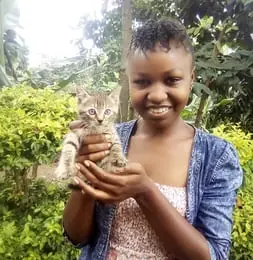
Your kitten meows in the litterbox because:
- It has physical pain.
- Its litterbox is dirty.
- The tray is too big.
- It does not like the type of litter.
Take your kitten to the vet if it shows signs of discomfort when in the litter tray. Clean the tray regularly, offer it a tray that fits its body size, and don’t change the litter type.
So you are happy that your kitten has finally learned to use its litterbox. But there’s one little problem; your kitten meows while in there.
This behavior is a cause for concern for a loving cat owner, and if you too are worried about your kitten, continue reading to learn more.
This article explains various reasons why your kitten meows in the litterbox, and signs that show if your cat is in pain.
Meowing in the litterbox could mean a whole lot of things. It could be that your kitten has a physical problem, doesn’t like its litter, or you just have a noisy pooper.
Learn more about the reasons:
1. Your Kitten has a Physical Pain
Normally, your kitten meows when demanding food or just seeking attention, which would not be a cause for worry. But when your kitten cries when using its litterbox, surely something must be wrong.
According to many cat owners, you can often tell the difference between a ‘pain meow’ and a normal meow.
Signs to watch out for in your kitten, that indicate discomfort while using its litterbox, are straining, loud vocalization, or avoiding its litterbox altogether.
Physical pain could make it difficult for your kitten to urinate or defecate. Common medical conditions that could make your kitty distressed are:
- Urinary tract infection (UTI). If this is what is bothering your kitten, you will notice it is straining to urinate, but very little urine comes out. Your kitty may also frequently enter its litterbox.
- Bladder inflammation: Feline interstitial cystitis may make it painful for your kitty to urinate.
- Constipation: If your kitten vocalizes more, or strains when using its litterbox, it could be because of constipation.
It’s important to take your kitty to the vet to rule out any of these problems.
2. The Litterbox Smells Terrible

No one likes to sit around a stinking and dirty litterbox. If you don’t like the smell, what about your kitten who has to use it?
If your kitty meows after or before using its litterbox, it could be sending a message to you; its litterbox smells terrible. Think of it as a plaintive meow.
The only way to ensure your kitten feels comfortable using its litterbox is constant cleaning.
If you are using clumping litter, scoop the solid and liquid clumps out at least twice a day. Other types of litter are also easy to clean. Use a litter shovel to remove areas soaked in urine, and replace the litter as needed.
Wash the litterbox using a mild detergent weekly, and rinse well. Good hygiene in your kitty’s litterbox might minimize vocalization when your cat wants to do its business.
Some people might assume that adding perfumes to mask litter smell might work, but your kitten does not like such strong scents. It could make your little one find the box unwelcoming.
Dangers of Keeping a Dirty Litterbox
Keeping a dirty litterbox in the house is dangerous both to you, and your little feline friend. Here is how you can be affected:
- Your kitty can get sick.
Your kitten will spend a considerable amount of time in the litterbox several times a day. If the box is dirty, your feline friend will be the first to get sick. It risks contracting liver, or bladder infection.
As your kitty squats over a litterbox full of feces, bacteria can enter its urethra causing UTIs.
- Exposure to ammonia can make you sick
Breathing in your kitten’s urine can expose you to toxic ammonia gas. This can trigger asthma attacks, headaches, and pneumonia.
Another bacterial infection humans can catch from dirty cat litter is Cat Scratch Fever. Children and people with a weakened immune system are at particular risk of catching the bacteria.
- Risk of toxoplasmosis
If your kitty is an outdoor cat, it could harbor the Toxoplasma gondii parasite, and excrete it in its feces. If you come into contact with the feces while changing a very dirty litterbox, you could become infected.
Living with a dirty litterbox presents a host of illnesses for you, and your pet. If your cat is crying on its litterbox, perhaps it’s because it is dirty. Ensure you keep it clean to avoid the above unpleasant illnesses.
3. Your Kitten Does not Like the Type of Litter

Your kitten is at a stage where it is developing a preference for a certain type of litter. If you have recently changed the litter your kitty was used to, you can expect some vocalization from them.
Cats can be very picky. It could meow to tell you that it does not like the type of litter because of its texture, or smell. Most kittens prefer medium to fine texture because their small paws feel comfortable on the fine surface.
As stated earlier, it would be better if you avoid strong scents in your kitten’s litter. If you are still on the fence regarding which type of litter your kitten prefers, put all of them to the test.
Place a few boxes with a different type of litter, and watch which one your kitten jumps into. You can also talk to the shelter home, and find out which litter your kitten was used to.
4. The Litterbox is too Big
The litterbox you give your kitten should match its body size. Comfort is key when you want your kitty to get accustomed to its litterbox.
It has to fit your kitten’s body when its steps inside, not too high for it. An ideal litterbox for your kitten should have lower sides, around 2-3 inches.
If you put a litterbox with high sides, your kitten may struggle to get in, and out of it. This may prompt it to meow each time it has to go to the bathroom. Kittens need something easy for them to access, and locate.
Your kitten’s age is also a factor to consider. If your furry friend is still tiny and just learning to poo, a shallow pan may be sufficient. This is easy to clean and refill.
Once your kitten is big enough, you can provide it with a litter box with shallow sides.
5. The Location of the Litterbox is Unwelcoming

Kittens tend to prefer corners of the house when they want to pee or poop. Therefore, place the litter in a corner of the house. Your furry friend will appreciate a little privacy.
If your kitty meows when using its litterbox, it could be that the location of the box is unwelcoming; such as being in an open area, or a high traffic area.
As you ensure the litterbox is kept in a private area, don’t forget to make the area easily accessible for your kitten. Under the cabinets or small closets may be a private location but not easily reachable to your pet.
Remove tall objects, or laundry surrounding the area, which are huge distractions.
How to Stop your Kitten from Playing in the Litterbox
Your kitten may reach a certain age, and decide that its litterbox is the best playground. Of course, this would not be so amusing because they will scatter the dirt all over the house.
Is it normal for your kitten to play in its litterbox? Let’s find out, and see what you can do to redirect the behavior.
Some cat owners say that their kittens outgrow this behavior. It’s just that they are curious and playful, but as they grow, they become less mischievous.
So yes, it’s perfectly normal for your kitty to dig aimlessly in its toilet, playing with it.
Why your Kitten is Playing with Poop
There are only two explanations for this behavior.
- Your kitten is still figuring out what is poop is, and what to do with it.
- It is bored.
The digging may be a fun activity for your kitty. Be patient with it, and it will soon pass this stage. In the meantime, there is something you can do to stop it
How to Stop it
1. Provide your feline with activity
Boredom can make a cat do strange things. If your kitty is under-stimulated, try to provide it with engaging play toys.
In a little while, it will forget about playing in the litterbox. After it’s tired, your kitten will probably curl up on its favorite corner to take a nap.
2. Scoop the litter
Always scoop away the dirty stuff from your cat’s litter. Your kitten will find a fresh bed of litter, and won’t be interested in playing there. (That’s if its main interest was playing with poop).
If you have a busy schedule and don’t have the time to scoop, you can consider buying your kitty a self-cleaning litterbox.
Conclusion
It is worrying to see your kitten meow while using its litterbox. It could be a medical problem, a dirty or over-sized litterbox, or maybe you just have a vocal kitty. This guide shows you what to do and if in any doubt, visit your vet.

References
- https://pets.webmd.com/cats/guide/solving-cat-litter-box-problems#1
- org/pet-care/cat-care/common-cat-behavior-issues/litter-box-problems
- https://www.petco.com/content/petco/PetcoStore/en_US/pet-services/resource-center/home-habitat/choosing-a-new-litter-box-for-a-cat-or-kitten.html#
- https://pets.thenest.com/dangers-dirty-cat-litter-box-3548.html